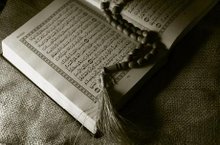
The picture above shows Bahadur Shah Zafar in exile in Rangoon, where he died. According to Wikipedia, it is the only know photograph of a Mughal emperor.
Shah Zafar, a poet who understood his condition as a virtual prisoner of the British living out the end of a dynasty, wrote:
Who ever enters this gloomy palace,
Remains a prisoner for life in European captivity.
Although an expert marksman, Zafar was no warrior. He patronized the poets, musicians and intellectuals of Delhi. And focused his energy and effort on the intellectual and cultural life of the city. He was tolerant towards all faiths: refusing to bow to the conservative imam’s demand to change his doctor who converted to Christianity and wary of Muslims who insisted on converting Hindus or slaughtering cows to fulfill Islamic obligations. On non-religious occasions, Shah Zafar is known to have refrained from entering mosques, since he also could not enter temples. He was not very adroit at managing his complex and cumbersome harem of many wives and concubines. His “harem was notoriously lax as far as discipline and security were concerned.” And the punishments he meted to his concubines who crossed the line were lenient, if administered at all.
The mutiny of 1857 took not just the British, but also Shah Zafar by surprise. The Indian troops – Muslim and Hindu – rallied around him as the rightful ruler of India with the political objective of restoring the Mughal Empire. The pious old (he was 82 years at the time) Sufi poet Shah Zafar, suddenly became the reluctant head of a rebel army that rallied to Delhi as the last seat of Mughal sovereignty. He vacillated, not because he was timorous or weak, but because he was torn among knowledge of imminent failure and duty towards the troops rebelling in his name, and a desire to protect his subjects, the Delhi dwellers caught in between two contending armies.
The rebellion had powerful religious overtones to it. The divide was as much between British rulers and Indians ruled, as Christian versus Hindu and Muslim. The rebellion struck a chord, because it was responding to an imperial shift away from a religiously tolerant, even assimilationist form of British rule, to one that combined Christian evangelism with British power. British agents, who had once taken on Indian wives and ways, and even Muslim religion and Hindu rituals, refraining from eating pork and beef, now felt that they were there to remake native societies in their own image. The rebels spared Muslim Englishmen (yes there were some in Delhi) but not Christian Indians. There were atrocities committed against English men and women trapped in Delhi. But all of this paled in comparison with British reprisals after the rebellion collapsed. The British soldiers committed mass murder, rape and the wholesale destruction of one of the world’s most beautiful cities. Palaces, mosques and madrasas were destroyed in a misguided effort to punish a city for the rebellion.
Shah Zafar was exiled to Rangoon, shortly afterwards, and died there in 1862, at the age of 87. He led a sad and humiliating exile. And his chief wife and surviving sons were not allowed to return to India under British rule. Today Shah Zafar’s burial place is, fittingly for a man who loved poetry and was both religious and tolerant, a Sufi shrine where Muslims in Burma come to worship.
One of his poems:
Lagta naheen hai jee mera ujray diar mein
Kiss kee banee hai aalam-e-napaedar mein
Keh do in hasraton say kaheen aur ja basein
Itnee jagha kahaan hai dil-e-daghdar main
Umr-e-daraaz maang kay laey thay chaar din
Do arzoo mein kut gaey do intizaar mein
Bulbul ko baghban say na sayyaad say gila
Qismat mein qaid thee likhee fasl-e-bahaar mein
Kitna hai badnaseeb Zafar dafn kay leeay
Do gaz zameen bhi mil na sakee koo-e-yaar mein
Translation:
My heart does not settle in this landscape of ruin
Who can feel settled in this evanescent world?
Tell these longings to go live someplace else
This scarred heart no longer has space.
Asking for long life, I was given only days
Half I spent wanting, the other half waiting.
The nightingale complains against groundsman nor trapper
Being caged in springtime was a matter of fate.
How hapless is Zafar, that even for burial,
He could not get a sliver of land near his lover.





1 comment:
I remember a teacher from school who used to love Bahadur Shah's poetry.
Now i know why.
Post a Comment